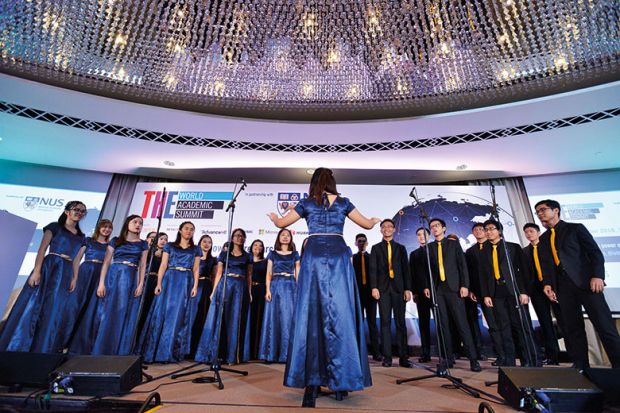A rankings-driven rationalisation of higher education’s key functions risks undermining the fundamental model of the research university, Australian National University vice-chancellor Brian Schmidt has warned.
Speaking at the Times Higher Education World Academic Summit in Singapore on 26 September, Professor Schmidt spelled out the dangers of a supposedly utopian drive to separate teaching from research. He said that the Humboldtian tradition – where education is informed by research – was coming under “severe” threat.
“Many universities are splitting their education from their research, and I suspect that university rankings are partially driving this behaviour,” he said. “The basic idea is simple. You massify education using non research-active faculty, who are very good teachers, [and] cross-subsidise research-only staff with the profits of teaching or other income.
“In theory you get students who are happy and inspired by these great teachers, and happy researchers who don’t have to teach.”
But Professor Schmidt warned that this approach would sever the teaching-research nexus and trigger a “dangerous and unsustainable” cycle. “In its first iteration students are being taught by a generation of teachers whose higher education was informed by research-active staff,” he said. “However, in the second generation, the students are going to be completely decoupled from the research of the day.”
He said that the trend would eventually engulf elite universities that resisted it. “The entire university environment is one of cross-fertilisation and intra-dependency.
“If a huge section of the university ecosystem suddenly drops out, the research universities – think of them as the apex predators, although that’s probably not the best analogy – will end up being isolated from the talent and ideas that currently emerge across the system.”
Professor Schmidt said that universities needed to “think deeply” about how research informs the teaching of their graduates, and not take it for granted. He warned fellow university leaders against being “slaves to the rankings” and their evolving methodologies.
“We must have the confidence to do the best we can at our missions, and hope the rankings sensibly reflect our successes and failures – noting each of our institutions’ idiosyncrasies,” he said.
Professor Schmidt added that the higher education community tended to “underplay” teaching, even though the government and businesses are far more interested in universities’ students than their research. Universities must not keep their assets, resources or the fruits of their research too close to their chests, he insisted.
“While there are reasons to protect the university’s intellectual property, I take my cue from Stanford and the Massachusetts Institute of Technology: it is even more lucrative to help make people and customers do well, so that they really are able to give back,” he said.
He said that Stanford, for example, had earned $45.4 million (£34.4 million) in royalty income from 808 separate technologies in 2016-17. “A nice chunk of change, but it rather pales in comparison to the $1.13 billion in philanthropy they received that same year.”
Professor Schmidt said that ANU’s general approach is to protect the intellectual property of individual researchers rather than the university as a whole. “My goal is to make sure any good idea of the university is as useful for society as possible.
“We’re investing in companies at an early stage and then being prepared to sell them off; co-investing with other institutions; letting entrepreneurs go for it on their own if that’s appropriate; or providing a lot of support for those who really don’t know what they’re doing.
“Rather than a one-size-fits-all, we have a team that sits down and tries to negotiate in each case for that particular person. The goal [is] to maximise the use of the IP outside, making sure we protect the individuals if that’s what they want.”
Professor Schmidt won the 2011 Nobel Prize in Physics for showing that the expansion of the universe was accelerating. He said that the research that had led to the award now “wouldn’t be funded by a politician in most countries”, even though it had required grants totalling just $8,000 at the time.
He said that universities had to argue the need for a “stock of knowledge” with no obvious practical applications. Conversations about how to translate that knowledge should come later, he said.
“[But] we can’t just say our job is only the stock of knowledge [like] we have done in the past. We have to aim for an enlightened understanding of why that stock of knowledge is important.”
john.ross@timeshighereducation.com
后记
Print headline: Research-teaching split ‘dangerous’, warns Nobel winner






